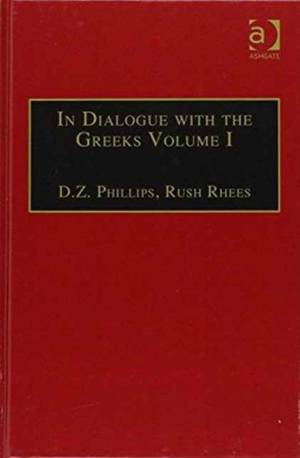
Door een staking bij bpost kan je online bestelling op dit moment iets langer onderweg zijn dan voorzien. Dringend iets nodig? Onze winkels ontvangen jou met open armen!
- Afhalen na 1 uur in een winkel met voorraad
- Gratis thuislevering in België vanaf € 30
- Ruim aanbod met 7 miljoen producten
Door een staking bij bpost kan je online bestelling op dit moment iets langer onderweg zijn dan voorzien. Dringend iets nodig? Onze winkels ontvangen jou met open armen!
- Afhalen na 1 uur in een winkel met voorraad
- Gratis thuislevering in België vanaf € 30
- Ruim aanbod met 7 miljoen producten
Zoeken
Omschrijving
This two volume set of Rush Rhees's In Dialogue with the Greeks brings together Rhees's work on the Presocratics and on Plato. The first volume addresses the central philosophical question: In what sense does philosophy investigate reality? In answering this question Rhees brings the work of the Presocratics into close relation with contemporary philosophy. The second volume takes up the questions bequeathed by the first. If reality does not have the unity of a thing, can it have any kind of unity at all? The alternative seems to be that reality has the unity of a form. In this second volume Rhees brings the perspective of a modern Wittgensteinian philosopher to bear on the dialogues of Plato concluding that language is not a collection of isolated games, rather we speak in the course of lives that we lead and what we say has its meaning from the place it occupies in the course of a life. D.Z. Phillips' editorial commentary is particularly helpful in assisting the reader with their bearings as they approach the text and elucidating the developments in Rhees's thinking.
Specificaties
Betrokkenen
- Auteur(s):
- Uitgeverij:
Inhoud
- Aantal bladzijden:
- 442
- Taal:
- Engels
- Reeks:
Eigenschappen
- Productcode (EAN):
- 9780754653714
- Verschijningsdatum:
- 28/10/2004
- Formaat:
- Genaaid
- Afmetingen:
- 159 mm x 235 mm
- Gewicht:
- 454 g

Alleen bij Standaard Boekhandel
+ 310 punten op je klantenkaart van Standaard Boekhandel
Beoordelingen
We publiceren alleen reviews die voldoen aan de voorwaarden voor reviews. Bekijk onze voorwaarden voor reviews.











